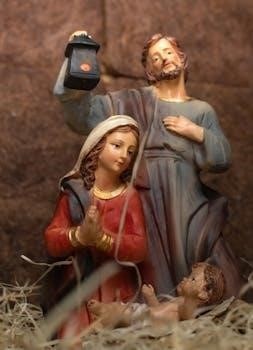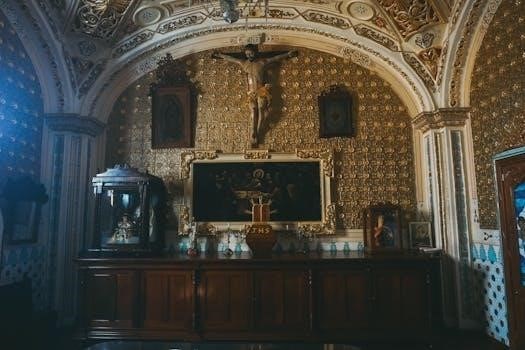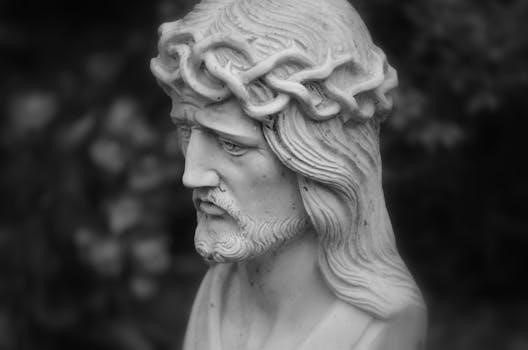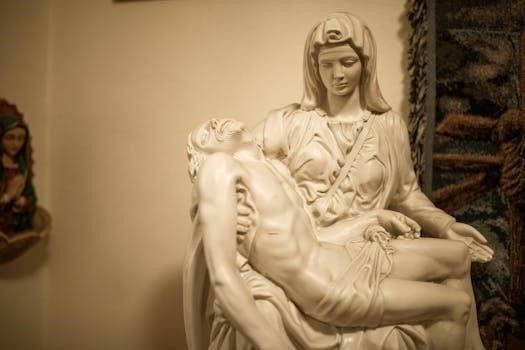last week of jesus life pdf

Holy Week, also known as Passion Week, is a sacred time for Christians, commemorating the final days of Jesus’ earthly ministry. This period, from Palm Sunday to Easter, is marked by significant events reflecting on Jesus’ sacrifice and resurrection.
Significance of Holy Week
The significance of Holy Week lies in its profound remembrance of the events leading to Jesus’ crucifixion and resurrection. This week is not merely a historical recounting, but a deeply spiritual journey for Christians worldwide. It’s a time for reflection on the immense sacrifice Jesus made, offering redemption and salvation. Holy Week allows believers to emotionally and spiritually connect with the core of their faith, understanding the weight of sin and the boundless grace offered through Christ. The week’s events, from Jesus’ triumphal entry to his ultimate victory over death, provide a powerful narrative of God’s love and promise. It encourages introspection, repentance, and a renewed commitment to following Christ’s teachings. The observance of Holy Week is not simply a tradition; it’s a vital opportunity to deepen one’s faith and embrace the hope of resurrection.

Timeline of Events
The timeline of Holy Week encompasses key moments, starting with Palm Sunday and ending with Easter. It includes the Last Supper, Jesus’s crucifixion, and his glorious resurrection, outlining the final days of His earthly life;
Palm Sunday⁚ Triumphal Entry into Jerusalem
Palm Sunday marks the beginning of Holy Week, commemorating Jesus’s triumphant arrival in Jerusalem. Riding on a donkey, Jesus entered the city amidst crowds who laid down palm branches and cloaks before him, hailing him as the Messiah. This event fulfilled prophecies from the Old Testament, signifying Jesus’s role as the promised king. The enthusiastic reception from the people demonstrated their anticipation for a leader who would liberate them. However, the scene also foreshadows the volatile nature of public opinion, which would soon turn against him. This entry into Jerusalem was not just a display of popularity but a calculated move to publicly declare his messianic identity, setting the stage for the events of the week to come. The joyous celebration of Palm Sunday is a stark contrast to the somber events that will follow, highlighting the dramatic shift in the narrative of Jesus’s final days.
Monday⁚ Cleansing of the Temple
On the Monday of Holy Week, Jesus entered the Temple in Jerusalem and, witnessing its desecration by merchants and money changers, he overturned their tables and drove them out. This act, known as the Cleansing of the Temple, was a powerful demonstration of Jesus’s authority and his outrage at the commercialization of the sacred space. He declared that the Temple should be a house of prayer, not a den of thieves. This event is recorded in multiple Gospels, emphasizing its significance. The cleansing of the temple was not only a physical act but also a prophetic one, symbolizing the need for spiritual purity and devotion. It also served as a direct challenge to the religious establishment, further intensifying the conflict between Jesus and the authorities. This bold action set the tone for the week, highlighting Jesus’s commitment to truth and righteousness. The cleansing of the temple was a pivotal moment that underscored the spiritual message of his mission.
Maundy Thursday⁚ The Last Supper
Maundy Thursday is a pivotal day in Holy Week, marked by the Last Supper, a Passover meal shared by Jesus with his disciples. During this sacred gathering, Jesus instituted the sacrament of Holy Communion, instructing his followers to partake in the bread and wine in remembrance of his sacrifice. This act symbolized his body broken and his blood shed for the forgiveness of sins. It was also a moment of profound teaching, where Jesus washed the feet of his disciples, demonstrating humility and service. This act set an example for his followers to love and serve one another. The Last Supper also included the prediction of Judas’s betrayal, adding a layer of solemnity and foreshadowing the events to come. The significance of this meal is central to Christian theology, representing the New Covenant established through Christ’s ultimate sacrifice. The Last Supper is a celebration and a remembrance.

Good Friday⁚ Crucifixion and Death
Good Friday marks the somber culmination of Holy Week, commemorating the crucifixion and death of Jesus Christ. This day is characterized by profound sorrow and reflection on the immense sacrifice Jesus made for humanity. After being betrayed and unjustly tried, Jesus was led to Golgotha, where he was nailed to a cross and left to die. His suffering was immense, both physically and emotionally, bearing the weight of the world’s sins. Despite this agony, Jesus demonstrated forgiveness and love, even for those who were crucifying him. His final words from the cross are a testament to his divine nature and his unwavering commitment to his mission. The death of Jesus was not the end but rather a pivotal moment in God’s plan for redemption. His death is believed by Christians to be the ultimate sacrifice, paying the price for humanity’s sins. The events of Good Friday are a call to repentance and a reminder of God’s boundless love.
Saturday⁚ Jesus in the Tomb
The Saturday of Holy Week, often referred to as Holy Saturday, is a day of quiet contemplation and waiting. Following the agonizing events of Good Friday, this day marks the time when Jesus’ body lay in the tomb. The Gospels describe how Joseph of Arimathea, with Nicodemus’ help, placed Jesus’ body in a newly carved tomb. This day is characterized by a sense of mourning and anticipation. It is a time when followers reflected on the loss of their leader, the hopes that seemed to be dashed, and the uncertain future. The tomb, a place of darkness and finality, became a symbol of the seemingly insurmountable barrier between life and death. For those who had placed their faith in Jesus, this day was likely filled with confusion, sorrow, and perhaps even despair. They had witnessed his miracles, listened to his teachings, and believed him to be the Messiah, but now he was gone. However, even in the silence and stillness of the tomb, there was an underlying sense of hope that lingered in the hearts of the believers.
Easter Sunday⁚ Resurrection
Easter Sunday marks the culmination of Holy Week, the day Christians celebrate the resurrection of Jesus Christ. This event is the cornerstone of the Christian faith, signifying victory over death and the promise of eternal life. Early in the morning, according to the Gospels, women went to the tomb only to find it empty. An angel appeared and proclaimed that Jesus had risen. This transformative event shifted the narrative from mourning to profound joy and hope. The resurrection is not just about Jesus returning to life; it is a testament to his divine nature and the fulfillment of prophecies. It signifies the ultimate triumph over sin and death. The disciples, initially filled with despair and confusion, were transformed by the resurrection, becoming bold witnesses to Jesus’ victory. Easter Sunday is a day of celebration, marked by church services, joyful hymns, and the declaration of “He is risen!” It is a time when Christians reflect on the hope and promise of eternal life made possible through Jesus’ sacrifice and resurrection.

Key Themes
Holy Week is rich with thematic significance, encompassing sacrifice, redemption, reflection, and repentance. These themes offer profound insights into the Christian faith, encouraging personal contemplation and spiritual growth.
Sacrifice and Redemption
The core of Holy Week revolves around the profound themes of sacrifice and redemption. Jesus’ willing journey to Jerusalem, fully aware of the impending suffering, underscores the magnitude of his sacrifice. His actions exemplify selfless love, offering himself as the ultimate atonement for humanity’s sins. This week highlights the concept of redemption through Christ’s death, where believers are liberated from the bondage of sin and offered eternal life. The events, from the Last Supper to the crucifixion, poignantly portray the depth of this sacrifice, emphasizing the love and grace God has for humanity. This narrative invites reflection on the cost of redemption and the transformative power of Jesus’ gift, encouraging believers to embrace the new life offered through his sacrifice. The week’s events are not just historical; they are profoundly spiritual, offering a pathway to understanding divine love and the promise of salvation.
Reflection and Repentance
Holy Week is a crucial time for reflection and repentance, urging believers to examine their lives in light of Jesus’ sacrifice. The events of the week, particularly the betrayal, suffering, and crucifixion, prompt introspection on one’s own failings and shortcomings. It provides a period for acknowledging sins and seeking forgiveness through genuine repentance. This is not merely a passive observance, but an active engagement with the story of Christ’s passion, inspiring a turning away from sin and a commitment to living a life aligned with His teachings. The somber tone of the week encourages self-examination and a desire for spiritual renewal. This period calls for humility and a deeper understanding of God’s grace. It’s an invitation to mend broken relationships, seek reconciliation, and move forward with a renewed heart, embracing the transformative power of faith. Through reflection and repentance, we prepare our hearts to fully appreciate the joy of the resurrection.

Theological Importance
The theological importance of Holy Week lies in its central role in Christian doctrine, encapsulating the core tenets of faith. It highlights the concepts of sacrifice, redemption, and the ultimate victory over death through Jesus’ resurrection. The events of this week are not mere historical occurrences, but profound spiritual truths revealing God’s love and plan for humanity’s salvation. The crucifixion, a pivotal moment, signifies the substitutionary atonement, where Jesus willingly bore the penalty for the sins of the world. This act underscores the gravity of sin and the immeasurable grace offered through faith in Christ. The resurrection, the culmination of Holy Week, is the cornerstone of Christian belief, demonstrating the power of God over death and providing hope for eternal life. Understanding the theological significance of Holy Week is essential for comprehending the Christian faith and its transformative power. It’s a reminder of the immense cost of redemption and the boundless love that underpins the entire narrative. The week’s events call us to contemplate the depth of God’s mercy and the profound implications for our lives.